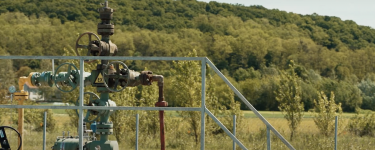The Energy Charter Treaty is a threat to climate action

Fossil fuel companies are suing countries for billions, over government policy decisions designed to reach climate goals such as the Paris Agreement. Many of these cases are being brought under the Energy Charter Treaty -- a treaty from the 1990s that provides Investor State Dispute Settlement (ISDS) investment protection for energy companies based in 53 countries.
ISDS is an extreme investor privilege in trade rules, that allows corporations to sue countries in secretive ‘corporate courts’ when governments make decisions that may negatively impact their projected profits. The UK, along with most countries in Europe and Central Asia, are members of the ECT, while worryingly, a huge number of countries in Asia and Africa are in the process of joining. All over the world, the ECT is being used to delay, reverse, and penalise countries over climate actions including oil drilling bans, the rejection of pipelines and fossil fuel taxation. Right now, the Netherlands is being sued by German energy companies RWE and Uniper for billions over the Dutch government’s plans to phase out coal-fired power generation by 2030.
What does the Energy Charter Treaty mean for the UK?
ISDS clauses in the Energy Charter Treaty mean that companies in the UK, which include some of the world’s biggest oil, gas, and mining companies, can sue governments across the world, if those countries take measures that affect their profitability. Right now, UK law firms and third-party arbitration funders are making fortunes from this exploitative and destructive legal mechanism.

End corporate courts
Demand that the UK starts saving the climate and stops corporate courts
Act nowWhilst the UK has not been sued under the ECT (yet), research shows that the UK has the highest amount of energy assets protected under the treaty per capita in Europe, creating a real threat of future cases. Active cases in Italy and Slovenia show just how destructive ISDS can be, for countries’ coffers, communities, and the climate.
Ascent Resources v Slovenia
Slovenian citizens come together to say no to toxic fracking.
London-based company, Ascent Resources, is said to be demanding over €120 million from Slovenia over a legal requirement that an environmental assessment be carried out prior to it breaking ground on a fracking project. ISDS is being used to penalise Slovenia for implementing its own environmental laws, and assessing the impact of a project that locals say would destroy their local ecology, and water resources close to the Mura River UNESCO biosphere reserve. Ascent is likely concerned that if the environmental impact assessment went ahead, the project could be ruled out on the basis of the damage it would cause.
Permission for the project has been the subject of targeted lobbying by UK political elites. Former UK government minister Jeremy Hunt lobbied on behalf of Ascent Resources on a visit to Slovenia in 2019, as did the UK Ambassador to Slovenia. As communities across the UK recall their own fights against fracking, we must stand with communities fighting against dirty and destructive extraction projects. To find out more about how local communities are taking action, watch the video above from our allies; the Corporate Europe Observatory.
Rockhopper v Italy
In another case, Rockhopper Exploration PLC, an oil and gas company with headquarters in Salisbury, England, is suing Italy for damages in excess of $275 million. Rockhopper says that Italy’s decision to ban drilling for oil and gas near the coast affected its profits. The Italian government was rightly more concerned about the potential for an oil spill, and the objections of the community in the Abruzzo region, who would have been severely affected by the development of the oil rig.
The $275 million figure is around ten times the Rockhopper’s original investment. This is not unusual under ISDS as investors can claim for decades’ worth of projected ‘future lost profits’. The way in which calculations of damages in ISDS claims are made can be speculative and highly preferable to the investor .
Perhaps even more remarkable is that Italy is being sued under the ECT, despite the fact that the country has already left the treaty.
Sunset clauses included in the ECT stipulate that even when a country leaves the treaty, the treaty continues to be effective in regards to investments made before the country has left. This means investors are permitted to sue countries for 20 years after they leave the ECT. The verdict on this case, anticipated in July 2021, could be a stark warning to the UK. Even if the UK were to leave the ECT today, without making changes to the ISDS regime, climate policy could still be dictated by oil companies until 2041.
We have to choose: Corporate Courts or Climate Action
These cases make clear that the ECT is a legal weapon that corporations wield to sue governments attempting to enforce environmental regulations, and respond to communities’ attempts to protect their environments from ecological damage. It is becoming increasingly clear that the ECT is a major obstacle to a green transition and climate justice.
The UK’s membership of the ECT allows it to extract public money from countries around the world transitioning to low-carbon economies. It also creates the threat that future UK governments, looking to meet our climate commitments under the Paris Agreement, will face billions in investor lawsuits.

Will you join us, stand with our allies in Slovenia, and help us end the Energy Charter Treaty?
Demand that the UK starts saving the climate and stops corporate courts
Act now



